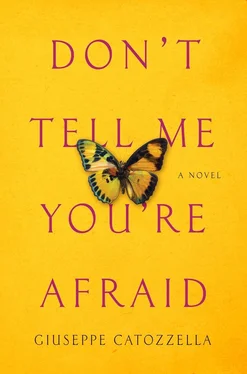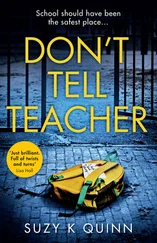“Hey, Abdi and Samia, move!” Duran yelled. The whole time we’d been standing motionless, looking around, he’d been on line for a taxi: Now he was standing next to a short, bald man in front of the open trunk of a yellow cab.
“Coming,” we chorused, like two fish out of water. The same word in unison.
We hopped in the taxi, me and Abdi in back, and headed toward the center of the city.
Skyscrapers. Skyscrapers everywhere, so tall that from the car you couldn’t see the tops of them. The scorching-hot sun reflected off the glass-and-steel facades, ricocheting in ways that seemed unnatural to us and that forced us to squint or lower our eyes. Again, as in the airplane, that powerful air-conditioning — it felt like being in a refrigerator.
Outside everything was dazzling and enormous. We passed the aquarium, a giant cube of water and light. Abdi was speechless; he pointed to it and then he didn’t speak for several whole minutes; he thought it was magic. In fact it looked that way. It was an immense glass structure that seemed full of water. But you couldn’t see the glass, and the water seemed to stand on its own.
“But…” was all he said.
“Yes, dear Abdi, haven’t you ever heard about it? Of course it’s magic, like many things here in China. Haven’t you ever heard of ancient Chinese magic?” I teased. Duran, up front, laughed. Abdi, however, was mesmerized, speechless.
After twenty minutes we arrived.
The hotel too was stunning. Nothing like the one in Djibouti.
Marble columns and floors, automatic doors.
The room was spacious and immaculate. There was a television set and a telephone. The softest bed I’d ever been in. Wall-to-wall carpeting. A wardrobe in which to put my few things. Towels of various sizes in the bathroom. Two amazing sinks, a huge counter with different kinds of creams, shampoos, and conditioners. On the marble floor, a rug in the colors of the Orient. And a bathtub.
We had the entire afternoon to ourselves. Duran had advised us only not to stray too far. But I didn’t have the slightest intention of going out. There was a beautiful bathroom that was too good to waste wandering around the city.
I filled the tub. The contact with the hot water was a wonderful sensation. Like being all wrapped up in a big caress. The first bath of my life. The tension, the adrenaline, the concerns and fears were quickly drowned in that water, swallowed up in its warm embrace.
I think I must have stayed there soaking for at least two hours.
Then I got out and turned on the TV. Chinese channels, American channels. I could barely understand the English, even though I had studied it for years at school. I stretched out on the bed with the remote in my hand. I turned to the coverage of the Olympic Games on BBC and CNN. In exactly six days I too would be on that screen. The whole world would watch me run, would read my face, as I was now doing with the athletes who were competing.
“You can’t lie,” I said to myself. Everything you are will be seen. The whole world will see it. One billion people.
I got up from the bed and stood in front of the mirror that went from floor to ceiling alongside the TV table. I was extremely thin. I was truly a string bean. My legs were still spindly like those of a fawn; Aabe had been right when I was a little girl and he used to call me that. They hadn’t filled out much since then.
I tried out two or three expressions up close to the mirror. Prostration at the end of the race. Poker-faced in front of the TV cameras before the start. A tense face during the race. Then I burst out laughing, all by myself, and lay down again.
I was on cloud nine.
That afternoon was wonderful. I had my whole life ahead of me, and my entire life would be full and glorious. I was a champion, and I had all the time in the world to prove it. I was a comet in a fabric studded with bright stars.
Six hours later we joined up again in the lobby to go out to dinner. I felt relaxed, and Abdi and Duran seemed so too.
We went out and ducked into the first restaurant we came to.
Abdi was hungry as a lion; he could have even eaten the table. He had to settle for the usual rice, though. He thought Chinese food was awful.
The opening ceremony of the Olympic Games was held two days later, on August 8. Being catapulted into a fantasy world inhabited by ten thousand other athletes from 204 nations, all parading in traditional dress, was the most thrilling event I had ever experienced. The delegations entered the Olympic stadium in alphabetical order by country. When it was our turn we were euphoric. The stadium had been going wild, still excited by the glittering ceremony: an endless succession of dazzling fireworks, light shows, music, dancing, and choreography that had involved thousands of performers including ballerinas, drummers, and opera singers. It was a celebration, a feast for the eye, ear, and soul. An incredible immersion in the warm, multihued heart that is universal love, whose different colors are nothing more than distinctive patches that strengthen it and allow the world to breathe.
Abdi, in front of us, carried the flag with pride. High, soaring, blue as the sky and sea. With the white star in the center pointing toward the firmament.
I, behind him, was in our traditional dress, with long braids attached to my hair for the occasion, and I felt as beautiful as I’d been only at Hodan’s wedding.
We went around the arena waving to tens of thousands of people. They all loved us, and we loved all of them. Most of all, we loved our country.
That night, in bed, I told myself that life had already given me more than I deserved.
But I was mistaken.
Four days later, on August 12, Mannaar was born. I got the call from Hodan at the hotel that morning. She was bursting with joy. She said that Mannaar was healthy and beautiful, the same as me, that she looked exactly as I did when I was born. I couldn’t wait to meet her. In my heart that morning I sensed that that child would be the joy of my life.
The day of my race, August 19, was extremely hot. The news that morning said that it would be one of the hottest days of the year. The heat didn’t worry me; I was used to it. It was the high humidity: The heavy air left me breathless.
I woke up calm, with the urge to run. During those thirteen days Abdi and I had trained well, in a sports facility available to teams that required it. I was charged, full of energy.
Outside the stadium we could already begin to hear the roar of the spectators in the stands. It sounded like the buzzing drone of a giant fly, which rose as we entered the belly of the immense Olympic stadium.
I would be in the heat with one of my all-time legends, the Jamaican Veronica Campbell-Brown, one of the fastest athletes in the world. To be able to see her — instead of just hearing her name on Taageere’s beat-up transistor radio — and to know that we’d be running in the same race was a feeling that made me dizzy.
We stayed out on the edge of the track for two whole hours to relish the sight of the other athletes who were competing. The more I watched the others, the more my adrenaline mounted. I couldn’t wait to get on the track. The stands were huge, the crowd enormous. An infinity of colors, of different sounds, of voices and confusion, of banners in all the languages of the world. There seemed to be even more people than on the day of the opening ceremony.
Having the privilege of watching the performance as participants was a joy. Around us there were runners, javelin throwers, high jumpers, and pole-vaulters, some wearing the uniforms of their own countries, others ready to compete as independents. Every fifteen minutes a different national anthem rose, and meanwhile it all blended together like a giant rainbow. Abdi and I were sitting side by side on the ground at the edge of the track. Passing before us were blond German giants in black tracksuits, Italians in their blue uniforms, British in their white and blue T-shirts, Americans in red and blue, Canadians in red, Portuguese in green. It was an intoxicating mix of sounds and colors. Standing out above it all, whatever their garb, were the black athletes. Flawless, extremely tall, their sculpted muscles gleaming with ointments and adrenaline. All around, wherever you looked, there were TV cameras, photographers with lenses as long as the militants’ rifles, journalists who swept down like hawks, microphones in hand, sporting badges from various newspapers.
Читать дальше




![Ally Carter - [Gallagher Girls 01] I'd Tell You I Love You But Then I'd Have to Kill You](/books/262179/ally-carter-gallagher-girls-01-i-d-tell-you-i-lo-thumb.webp)







